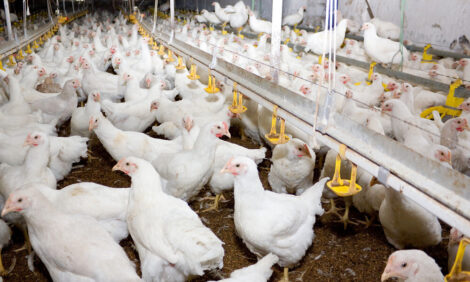



Bird Flu Trade Bans on US Poultry to Affect Pork and Beef
US - News that more than 40 countries have banned poultry imports from Minnesota after a lethal strain of avian influenza was confirmed in a turkey flock has now been compounded by news of confirmed cases in Missouri and Arkansas turkeys.How long those bans are in effect and whether more countries stop buying poultry from Minnesota or other parts of the United States will determine what, if any effect the ban will have on poultry, beef and pork prices, said Kansas State University agricultural economist, Glynn Tonsor.
The outbreak linked to H5N2 avian influenza in Minnesota, confirmed by the U.S. Department of Agriculture’s Animal and Plant Health Inspection Service in early March, was the first finding in an area called the Mississippi Flyway. That outbreak killed 15,000 birds in about a week.
H5N2 has now also been confirmed at two commercial turkey farms in Jasper and Moniteau counties in Missouri and a commercial turkey flock in Boone County, Arkansas.
No human infections with these viruses have been detected, according to a March 10 APHIS statement, but state officials are working with poultry workers at the affected farms to ensure they are taking proper precautions.
“If additional countries make announcements banning US poultry products from either specific regions or the country entirely, that would result in U.S. poultry products being diverted to other customers,” said Dr Tonsor, who is a livestock market specialist with K-State Research and Extension.
“In some cases this is other foreign customers and in other cases, more poultry will be consumed here domestically. In both cases, the diverted products going to alternative channels will occur at lower transaction prices. Otherwise they would have voluntarily been re-channelled already.”
As poultry prices decline from these events, he said, the spillover on both beef and pork is expected to be adverse for those industries.
“Narrowly, with lower poultry prices, we typically see pressure on pork and beef demand as the three meats are substitutes and collectively comprise the vast majority of red meat and poultry production and consumption,” said Dr Tonsor, who is a livestock market specialist with K-State Research and Extension.
The biggest uncertainty, he said, is the exact duration and extent of poultry trade bans: “We know the directional impacts, but the economic magnitude is largely a function of the duration and extent which are yet to be established.”
In a March 11 statement, the Kansas Department of Agriculture said it is monitoring a control zone in southeast Kansas, including Cherokee and Crawford counties, after the avian influenza case was confirmed in Jasper County, Missouri.
Avian influenza exists naturally in many wild birds and can be transmitted by contact with infected animals or ingestion of infected food or water.
Kansas backyard poultry producers in the Crawford and Cherokee county area are asked to self-report their flocks to the Kansas Department of Agriculture at 785-564-6601, in order to help them monitor the situation and control any spread of the disease.
The combined value of US production from broilers, eggs, turkeys, and the value of sales from chickens in 2013 was $44.1 billion, according to the USDA.








